

Awareness « Taming the spaces. I was reading this sunday morning the chapter from the Cambridge Handbook of Sociocultural Psychology (2007) by (eds.)

Jaan Valsiner and Alberto Rosa: Social basis of self-reflection by Alex Gillespie pp.678-691 Since i have been thinking in terms of inter-subjectivity, activity theory and cultural semiotics earlier, while now my understanding has more and more shifted towards the embodied cognition and hybrid ecology ideas, i tried to see where my standing-point is and where it differs from socio-cultural ideas. It seems to me that the basic idea in this chapter is recognizing that signs (but then also tools, since both are mediators of action what person needs to realize his objectives in an environment?)
Cowley.pdf (application/pdf Object) Hoffding.pdf (application/pdf Object) Deleuze « Fractal Ontology. Universal_man_as_supplementary_value_print_version.pdf (application/pdf Object) Seigworth. Alain Badiou-Bibliography/The Event in Deleuze/Lacan Dot Com. Deleuze always paid tribute to Sartre as the figure who, during the thirties and forties, woke French philosophy from its academic slumbers.
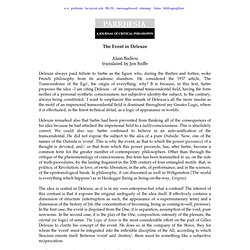
He considered the 1937 article, 'The Transcendence of the Ego', the origin of everything: why? It is because, in this text, Sartre proposes the idea - I am citing Deleuze - of 'an impersonal transcendental field, having the form neither of a personal synthetic consciousness nor subjective identity-the subject, to the contrary, always being constituted.' I want to emphasize this remark of Deleuze's all the more insofar as the motif of an impersonal transcendental field is dominant throughout my Greater Logic, where it is effectuated, in the finest technical detail, as a logic of appearance or worlds. Deleuze remarked also that Sartre had been prevented from thinking all of the consequences of his idea because he had attached the impersonal field to a (self)-consciousness. This is absolutely correct. Journal of Nietzsche Studies, No. 14 (Autumn 1997), pp. 64-97. Skrebowskistoicsessay.pdf (application/pdf Object)
a1f64e066bed0de5334957da48bb40ca00cf38cc (application/pdf Object) Dukic.pdf (application/pdf Object) Dreyfus and Deleuze on L'habitude, Coping, and Trauma in Skill Acquisition - International Journal of Philosophical Studies. Alia Al-Saji, The memory of another past: Bergson, Deleuze and a new theory of time. Through the philosophies of Bergson and Deleuze, my paper explores a different theory of time.
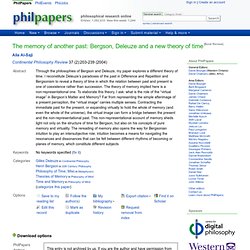
I reconstitute Deleuze’s paradoxes of the past in Difference and Repetition and Bergsonism to reveal a theory of time in which the relation between past and present is one of coexistence rather than succession. The theory of memory implied here is a non-representational one. To elaborate this theory, I ask: what is the role of the “virtual image” in Bergson’s Matter and Memory? Far from representing the simple afterimage of a present perception, the “virtual image” carries multiple senses. Chaos, Territory, Art.
Elizabeth Grosz May, 2008 Cloth, 136 pages, ISBN: 978-0-231-14518-3 $25.00 / £17.50 Instead of treating art as a unique creation that requires reason and refined taste to appreciate, Elizabeth Grosz argues that art-especially architecture, music, and painting-is born from the disruptive forces of sexual selection.
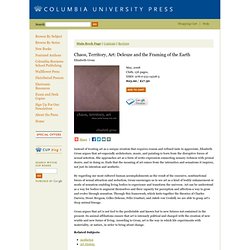
She approaches art as a form of erotic expression connecting sensory richness with primal desire, and in doing so, finds that the meaning of art comes from the intensities and sensations it inspires, not just its intention and aesthetic. By regarding our most cultured human accomplishments as the result of the excessive, nonfunctional forces of sexual attraction and seduction, Grosz encourages us to see art as a kind of bodily enhancement or mode of sensation enabling living bodies to experience and transform the universe. Art can be understood as a way for bodies to augment themselves and their capacity for perception and affection-a way to grow and evolve through sensation. Shankar Raman: "Marvell's Now" {*style:<b> </b>*} John Rogers, "Oliver Cromwell & Charles the First" (after a painting by Paul Delaroche) {*style:<b> Re: deleuze and time.
Parrhesia01_reynolds.pdf (application/pdf Object) Andrei Tarkovsky’s Mirror viewed through Gilles Deleuze’s ‘time-image’ By Kierran Horner.
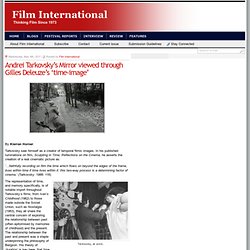
Tarkovsky saw himself as a creator of temporal filmic images. In his published ruminations on film, Sculpting in Time; Reflections on the Cinema, he asserts the creation of a real cinematic picture as: ‘…faithfully recording on film the time which flows on beyond the edges of the frame, lives within time if time lives within it; this two-way process is a determining factor of cinema.’
(Tarkovsky: 1988: 118) Continental Philosophy Review, Volume 37, Number 2. DeleuzeWhitehead.pdf (application/pdf Object) Deleuze, Gilles Deleuze is a key figure in postmodern French philosophy.
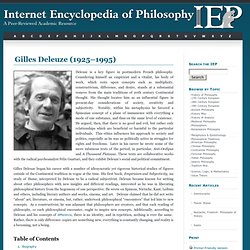
Considering himself an empiricist and a vitalist, his body of work, which rests upon concepts such as multiplicity, constructivism, difference, and desire, stands at a substantial remove from the main traditions of 20th century Continental thought. His thought locates him as an influential figure in present-day considerations of society, creativity and subjectivity.
Notably, within his metaphysics he favored a Spinozian concept of a plane of immanence with everything a mode of one substance, and thus on the same level of existence. He argued, then, that there is no good and evil, but rather only relationships which are beneficial or harmful to the particular individuals. This ethics influences his approach to society and politics, especially as he was so politically active in struggles for rights and freedoms. Table of Contents 1. Due to his families’ lack of money, Deleuze was schooled at a public school before the war. 2. A. 3. Catherine-Keller_Complicities.pdf (application/pdf Object) Program. Bryan Smyth (University of Memphis, USA) Merleau-Ponty’s evocation of “a past that has never been present” refers to the pre-reflective engagement with sensory givenness that forms the ground of perceptual experience. Paradigmatizing binocular vision, Merleau-Ponty described this engagement as a process whereby the sensing body enacts a “focusing movement” that achieves a synchronous rhythm with the environing world.
Sensing is thus the locus of what Husserl called proto-temporalization [Urzeitigung]: the sensing body “secretes time” because it “brings into existence a past and a future for a present.” As our primordial contact with reality, then, perceptual sense emerges only as historical sense—without a “historical orientation,” there is no presence but only perceptual non-sense. As Merleau-Ponty noted, though, concerning the past it is not a “true history” that perception invokes. Reynolds J - Wounds and Scars - Deleuze on the Time and Ethics of the Event. From Singularity to Identity and Back: Deleuze & Sartre in Momentary Solidarity. (mass)think! Deleuze, Différence et répétition (Difference and Repetition), Chap 2, paragraph 2.
Previously we discussed Hume's theory of causal relations. We took his examples of Fire & Heat, and the communication of motion between colliding billiard balls. We noted that each instance of any such experience of conjoined impressions is unique. But the mind finds similarities between instances of conjoined impressions.
So all the instances of fire resemble each other. And all the experiences of heat are alike as well. Our imagination runs easily from one idea to any other that resembles it, and that this quality alone is to the fancy a sufficient bond and association. After we have observ'd the resemblance in a sufficient number of instances, we immediately feel a determination of the mind to pass from one object to its usual attendant, and to conceive it in a stronger light upon account of that relation. Postmodern Culture - The Openness of an Immanent Temporality. Gilles Deleuze: psychiatry, subjectivity, and the passive synthesis of time - Roberts - 2006 - Nursing Philosophy.
Time, human being and mental health care: an introduction to Gilles Deleuze - Roberts - 2005 - Nursing Philosophy. Long Sunday: Deleuze on Hume. Deleuze on Hume from Empiricism and Subjectivity: An Essay on Hume's Theory of Human Nature Preface to the English edition WE DREAM SOMETIMES of a history of philosophy that would list only the new concepts created by a great philosopher – his most essential and creative contribution.

The-transversal-thought-of-gilles-deleuze.pdf (application/pdf Object) B o r d e r l a n d s e-journal. Derrida and Deleuze on time, the future, and politics Jack Reynolds University of Tasmania 1.
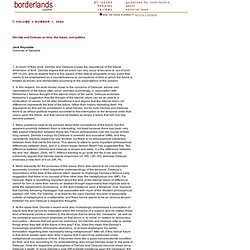
In much of their work, Derrida and Deleuze invoke the importance of the futural dimension of time. Read_Groves-Futures-of-Causality.pdf (application/pdf Object) The Deleuze dictionary. 04. Insects and Incest : From Bergson and Jung to Deleuze. Between Deleuze and Derrida. Deleuze on Intensity Differentials and the Being of the Sensible* The Image of Thought* If Not Here, Then Where? On the Location and Individuation of Events in Badiou and Deleuze.
If Not Here, Then Where?
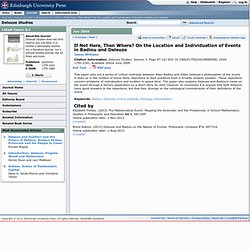
On the Location and Individuation of Events in Badiou and Deleuze Citation Information. . Volume 3, Page 97-123 DOI 10.3366/E1750224109000506, ISSN , Available Online . This paper sets out a series of critical contrasts between Alain Badiou and Gilles Deleuze's philosophies of the event. It does so in the context of some likely objections to their positions from a broadly analytic position. Cited by Elizabeth Freitas. (2013) The Mathematical Event: Mapping the Axiomatic and the Problematic in School Mathematics. The Determination of Sense via Deleuze and Blanchot: Paradoxes of the Habitual, the Immemorial, and the Eternal Return. The Determination of Sense via Deleuze and Blanchot: Paradoxes of the Habitual, the Immemorial, and the Eternal Return Citation Information. .
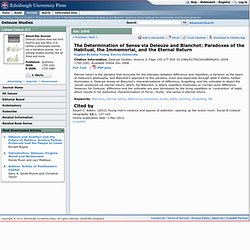
Volume 2, Page 155-177 DOI 10.3366/E1750224108000263, ISSN , Available Online . Eternal return is the paradox that accounts for the interplay between difference and repetition, a dynamic at the heart of Deleuze's philosophy, and Blanchot's approach to this paradox, even and especially through what it elides, further illuminates it. Deleuze draws on Blanchot's characterisations of difference, forgetting, and the unlivable to depict the ‘sense’ produced via eternal return, which, for Blanchot, is where repetition implicates or ‘carries’ pure difference. Heidegger and Deleuze on Death (Nihil Unbound - Chapter IV) 6.1 Who is time? Departing from Heidegger’s 1924 lecture “The Concept of Time” Brassier traces how the question ‘what is time?’ Transforms into the question ‘who is time?’ Whatness corresponds to essence (Das Was), and essence (Ousia) is understood in turn as presence-at-hand (Vorhandenheit); being-present. Conf_cg_bolzano030506.doc - Powered by Google Docs.
Crystals_of_Time.pdf. Deleuze_enaction.pdf. NewTA.pdf - Powered by Google Docs. Love paper - Powered by Google Docs. The Project Gutenberg eBook of The Living Present, by Gertrude Atherton. Famous Quotes on Living in the Present. Living in the present has been sought after for centuries by far-sighted leaders from all walks of life. They have wisely learned that it is always the present moment. Indeed, nothing real happens except in the present moment. Therefore, all happiness is in the present and unhappiness comes from thoughts about past hurts and future worries. Being present enables you to live and love to your fullest potential. Your health, your love life, your confidence and your inner peace all rise. The First Rule of Inner Peace is John Kuypers’ newest book on inner peace and happiness in the present moment. Get John’s original top-selling book on living in the present: What’s Important Now: Shedding the Past So You Can Live in the Present.
For couples mired in conflict and wounds from the past without hope for the future, The Near-Far Power Struggle is John Kuypers’ powerful and short ebook that reveals the spiritual mystery to marital conflict and what to do. Dr. Success in Complexity - Scrum. Most significant software development projects feel more like a ride on a roller-coaster than a managed success. Aikido: Living by Design. Wake Up: A Guide to Living Your Life Consciously. ScholarlyCommons@AUT: Living events: a metaphor for design.